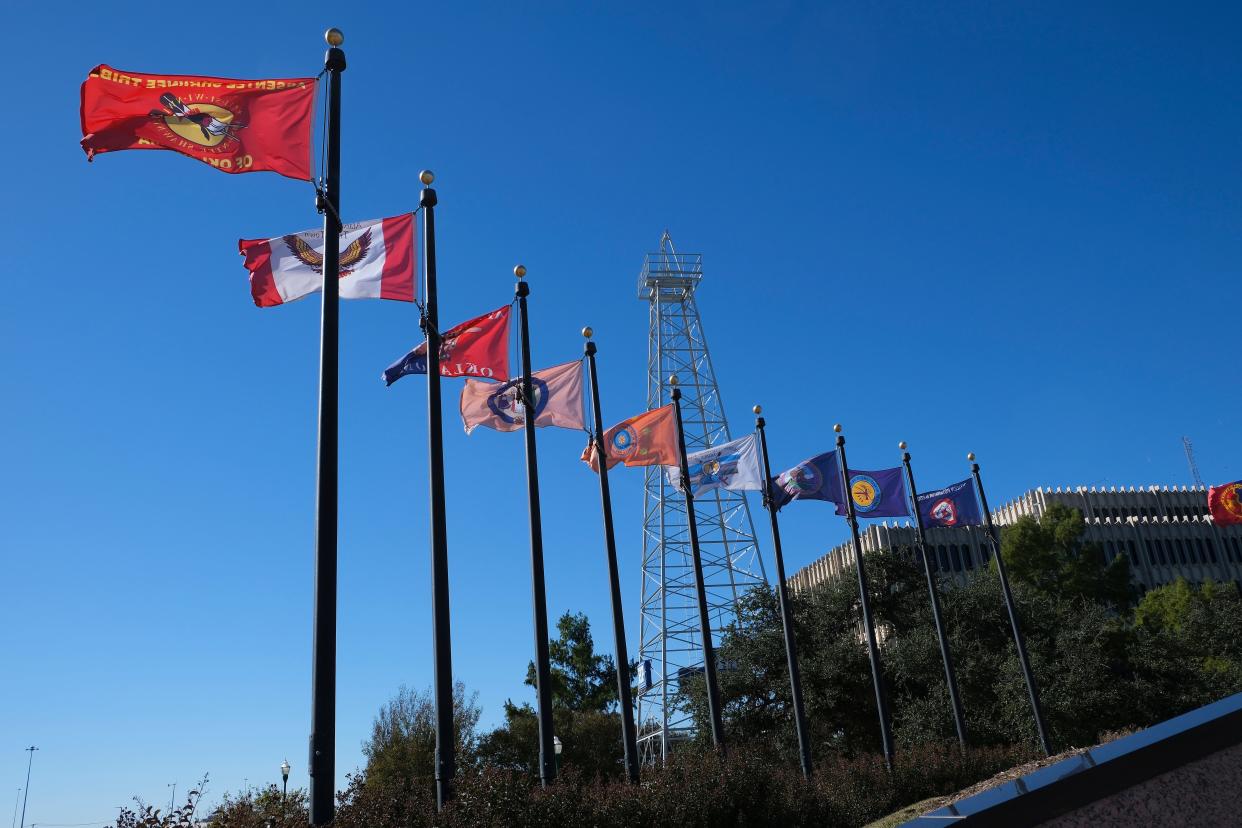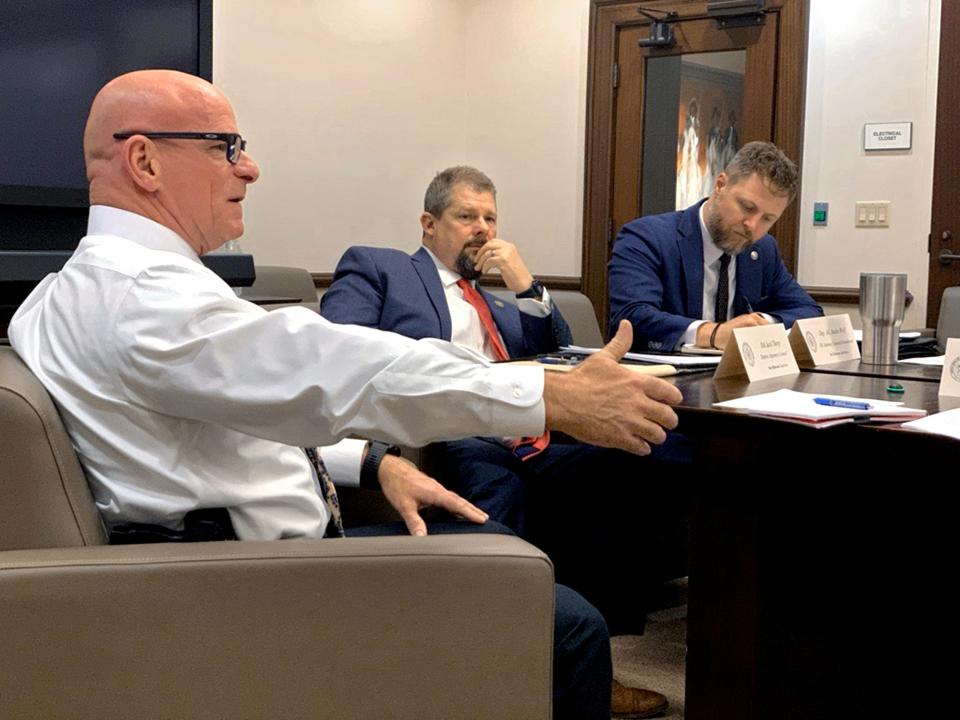Oklahoma governor's reservation safety task force is wrapping up. Here's what is in store

- Oops!Something went wrong.Please try again later.
The governor’s task force aimed at resolving jurisdictional disputes on tribal reservations expects to issue a report next week with a “blueprint” to modernize public safety agreements between state and tribal governments.
It is unclear exactly what issues the One Oklahoma Task Force will cover in its report — or how its suggestions will differ from the reams of state-tribal agreements already in place. It also remains to be seen whether tribal officials will embrace the ideas put forward by a task force made up of state officials, lawmakers and law enforcement officers. No one representing a tribal nation is part of the group.
Tricia Everest, Oklahoma’s public safety secretary who chairs the task force, acknowledged that some issues the group has discussed are too complex to be fully addressed. Gov. Kevin Stitt gave the task force five months, ending June 1, to complete its work.
“This won’t solve all the problems, yet it brings a lot of the right people to the table to address” issues moving forward, Everest said after the task force met Monday for its second to last time. It will meet again May 20 to finalize its report, which will be delivered to Stitt, legislative leaders, tribal elected officials and the state’s congressional delegation.
More: An Oklahoma trooper ticketed a driver over her tribal license plate. What happened next?
State lawmakers likely will hold hearings in the fall to study the most complicated issues that came up during the task force’s discussions, such as figuring out how to close technology gaps between state and tribal law enforcement agencies, Everest said. She said Sen. Jessica Garvin, R-Duncan, had suggested the interim study. Garvin sits on the task force but did not attend Monday’s meeting, and her office did not return a message to discuss what she had planned.
Rep. Ken Luttrell, R-Ponca City, who represents the House on the task force, said he believed an interim study would allow officials to dive deeper into the issues state and tribal law enforcement officers face.
Luttrell, a citizen of the Cherokee Nation, said he also believed tribal officials may be open to taking part in the hearings.
“I’m cautiously optimistic we would have more involvement in a forum like that than perhaps this task force had,” he said.
Why many tribal leaders refused to participate in Gov. Kevin Stitt's task force
Stitt created the task force in December after a flare-up between Okmulgee County jailers and Muscogee Nation Lighthorse Police officers. He said the incident highlighted the “broken system” created by McGirt v. Oklahoma, the landmark Supreme Court ruling that has led to the recognition of nine tribal reservations in the eastern part of Oklahoma. State courts lack the power to prosecute Native Americans on reservations. Those cases go to tribal or federal courts instead.
Stitt reserved two chairs on the new task force for tribal officials. But leaders of the five largest tribes affected by the McGirt ruling — the Cherokee, Chickasaw, Choctaw, Muscogee and Seminole nations — formally refused to participate. They cited Stitt’s framing of the task force’s mission and the lack of seats the governor assigned to tribal nations. Oklahoma is home to 38 federally recognized tribal nations.
At the start of Monday’s meeting, Everest noted that the two seats assigned to tribal nations remained empty. She said later that although tribal officials weren’t present at the meetings, she and other task force members have talked one-on-one with tribal leaders in recent weeks.
Stitt charged the task force with recommending legal and policy changes to address the “negative effects” of McGirt. He also ordered the task force to craft uniform working agreements that would cover state and tribal police and jails. The task force did discuss the possibility of creating a new umbrella agreement that state and tribal law enforcement agencies could use. But the task force scaled back that idea at the advice of Deputy Attorney General Justin Wolf, according to minutes from the group’s April meeting. The task force is now working instead on a “blueprint” of items to attach to agreements that already exist.
Everest said the ultimate goal is to make everyone safer by streamlining how agencies work together on tribal reservations.
“The amount of time that someone’s on the side of the road is dangerous for every law enforcement (officer) and every member of the public, and it’s not a time to have jurisdictional issues,” she said. “Equally, when you’re bringing someone in to county jail, or to a new jail, that is not the time.”
At one point during the meeting, Everest asked how the Okmulgee County jail dispute could have “ideally” been different. The December altercation between county jailers and Lighthorse police started after the latter officers tried to drop off a non-Native man they had arrested on drug charges. Jail staffers initially refused to book the man.
Cherokee County Sheriff Jason Chennault offered a short answer to Everest’s question on how the situation could have gone differently. “Well, by everybody getting along,” he said.
More: Oklahoma AG challenges Muscogee Nation's case against county jailer over dispute caught on video

Everest asked task force members to weigh in for a final time about issues they would like to see covered in the report.
Oklahoma Department of Public Safety Commissioner Tim Tipton was perhaps the most direct when it was his turn to respond. He said he wanted to address the loss of fees and fines once collected by state law enforcement agencies that now go to tribal law enforcement agencies instead.
Many cities have struck agreements with tribes so they are eventually reimbursed for traffic tickets their officers write to Native American drivers, but no such agreement exists at the state level.
Tipton said he also would like to see guidance on how state officers can enforce the law uniformly when tribal laws can vary.
“So, clarity of law is what my hope is,” he said, “which goes hand in hand with officer safety.”
This article originally appeared on Oklahoman: Oklahoma lawmakers may study public safety on tribal reservations

